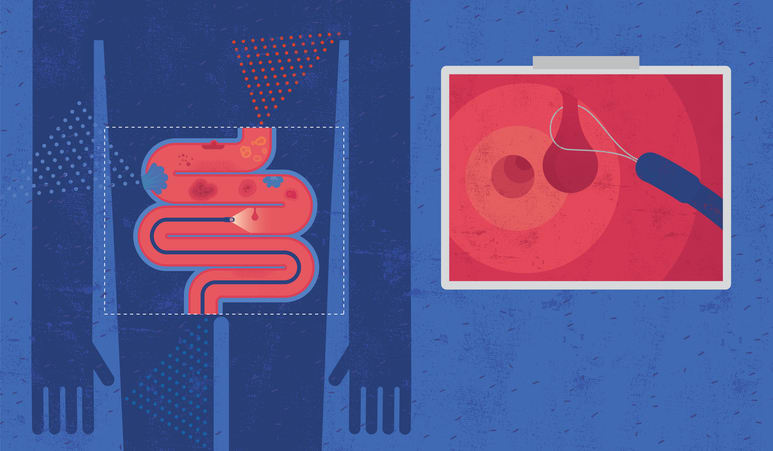How does your diet affect inflammation?

[4 MIN READ]
In this article:
-
Inflammation is your body’s natural response to something that doesn’t belong.
-
When working correctly, inflammation fights off infections and protects your health. If inflammation lingers too long, it can damage healthy tissues and lead to serious health issues in the joints, intestines, heart and blood vessels.
-
The director of the IBD Center at Swedish Medical Center describes inflammation and answers questions about the important role this common disorder plays in your health.
How does your diet affect inflammation?
Inflammation is a hot topic right now – no pun intended – and for good reason. When working correctly, inflammation fights off infection and is vital to your body’s healing process. But if it lingers too long, inflammation harms healthy tissues and may lead to chronic disease.
“Inflammation is a normal immune response meant to protect us against infections and tumors. However, it can become harmful when it exceeds a certain threshold," says Michael Chiorean, M.D., director of the IBD Center at Swedish Medical Center. “Generally, in clinical practice, we’re dealing with inflammation that’s inappropriate, exaggerated or overactive.”
We talked to Dr. Chiorean to get answers to common questions about inflammation and its impact on your health. Here’s what he shared.
What is inflammation?
“For most people, ‘inflammation’ refers to any discomfort in the body like joint pain, mental fog or feeling hot or cold. For clinicians, inflammation has a more specific definition with measurable signs and markers,” says Dr. Chiorean.
Inflammation is your body’s response to something that doesn’t belong there. When a virus enters your body, your immune system sends out inflammatory cells to fight the invader and begin healing. The process may cause swelling and slight pain, but those are natural signs that it’s working as it should.
However, if your body continues to produce inflammatory cells even when they are no longer needed, they may attack healthy tissue and cause lasting harm to your health.
There are two main types of inflammation, according to the National Center for Biotechnology Information (NCBI). They are:
- Acute inflammation is the body’s natural response to illness or injury. It may last several days or a few weeks and subside as healing occurs.
- Chronic inflammation occurs when your body keeps producing inflammatory cells even when they’re not needed anymore. It may last for months or even years and has been linked to several chronic health conditions such as heart disease and diabetes.
What are the signs and symptoms of inflammation?
The warning signs of inflammation vary depending on the type of inflammation and its location in the body.
Red flags that indicate acute inflammation include:
- Heat
- Pain
- Redness and swelling in the affected area
- Loss of function
Chronic inflammation affects your body differently than acute inflammation and may cause:
- Body pain
- Excessive fatigue
- Depression, anxiety and other mental health disorders
- Gastrointestinal issues such as acid reflux, diarrhea or constipation
- Unintentional fluctuations in weight
- Frequent infections
What causes inflammation?
“Inflammation involves various parts of the immune system working together to fight infections, viruses, bacteria and parasites. In some cases, it’s not related to infection at all but to other metabolic issues, like low-grade inflammation seen in cardiology,” says Dr. Chiorean.
“Factors like smoking, diet and obesity also influence inflammation levels, especially when fat tissue produces inflammatory signals that increase health risks,” he adds.
According to the NCBI, the most common causes of inflammation are:
- Germs like bacteria, fungi or viruses
- External injuries, such as a splinter or broken arm
- Exposure to chemicals or radiation
- Diseases or medical conditions, including cystitis, bronchitis and dermatitis
Risk factors associated with inflammation
Several factors can increase your risk of chronic inflammation, according to the NCBI, including:
- Increased age
- Obesity
- A diet high in saturated fat, trans-fats or refined sugar
- Smoking
- Low levels of testosterone and estrogen
- High stress levels
- Sleep disorders
Health risks caused by chronic inflammation
Chronic inflammatory diseases are among the most significant causes of death worldwide, according to the National Library of Medicine.
Research shows inflammation may lead to many chronic conditions, including:
- Thickening or hardening of the arteries, called atherosclerosis
- Diabetes
- Heart disease
- Inflammatory bowel disease
- Arthritis and joint disease
- Allergies
- Chronic obstructive pulmonary disease (COPD)
Diet and inflammation
Research suggests that up to 60% of chronic diseases may be preventable by people eating a more nutritious, well-balanced diet. Several different diets, including the Mediterranean diet and the DASH eating plan, have been shown to help reduce inflammation. But regardless of what you call your diet, the important thing is to make healthy food choices, says Dr. Chiorean.
“The best advice is to focus on a healthy, balanced diet that maintains weight and manages insulin and cholesterol levels,” says Dr. Chiorean. “Specific diets may not need to be tailored to be anti-inflammatory, as general healthy eating often brings similar benefits. For those with specific conditions, like diabetes or kidney disease, some dietary adjustments may be beneficial. But ultimately, a healthy diet and regular exercise help reduce stress on the body, promoting overall well-being.”
Learn more and find a physician or advanced practice clinician (APC)
Whether you require an in-person visit or want to consult a doctor virtually, you have options. Contact Swedish Primary Care to schedule an appointment with a primary care physician. You can also connect virtually with your doctor to review your symptoms, provide instruction and follow up as needed. And with Swedish ExpressCare Virtual, you can receive treatment in minutes for common conditions such as colds, flu, urinary tract infections and more. You can use our provider directory to find a specialist or primary care physician near you.
Information for patients and visitors
Additional resources
Eat your heart out: Food for better heart health
Food Can Be Powerful Medicine—and So Can Its Temporary Absence
This information is not intended as a substitute for professional medical care. Always follow your health care professional's instructions.
Providence Swedish experts in the media
Follow us on Facebook, Instagram and X.


